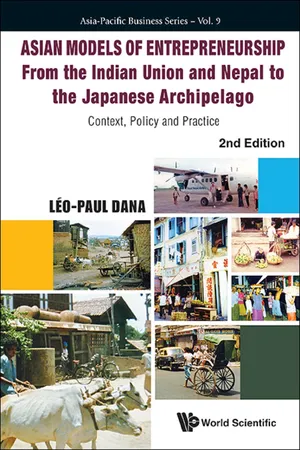
Asian Models of Entrepreneurship — From the Indian Union and Nepal to the Japanese Archipelago
Context, Policy and Practice
- 424 pages
- English
- ePUB (mobile friendly)
- Available on iOS & Android
Asian Models of Entrepreneurship — From the Indian Union and Nepal to the Japanese Archipelago
Context, Policy and Practice
About This Book
In this book, Leo-Paul Dana makes it clear that much can be learnt about the nature of entrepreneurial activity when we delve into the unique characteristics of different nations of South Asia, South-east Asia and East Asia. Through in-depth analyses and comprehensive reviews of many Asian countries, the profound differences both among and within countries of the region become vividly apparent. Dana juxtaposes the explosion in entrepreneurial growth within China against the struggles to build an entrepreneurial community in Japan, or the enlightened public policy leadership in Singapore against the crisis-driven developments in Korea. The range of factors identified within each of the 15 countries examined by Dana is not an example of random influences on the entrepreneurial process, because they can be construed in more systematic and logical ways. Thus, the book uncovers the Chinese model of gradual transition, the Royal Cambodian model, and the Doi-Moi model, among many others. The reader is challenged to grasp these different models, and identify their commonalities and differences.
Request Inspection Copy
Contents:
- Introduction
- Culture and Enterprise
- Cambodia
- China
- India
- Indonesia
- Japan
- Korea
- Laos
- Malaysia
- Myanmar
- Nepal
- The Philippines
- Singapore
- Taiwan
- Thailand
- Vietnam
- Conclusion
Readership: Business undergraduates; practitioners and entrepreneurs who are interested in conducting business in Asia.
Frequently asked questions
Table of contents
- Cover
- HalfTitle
- ASIA-PACIFIC BUSINESS SERIES
- TitlePage
- Copyright
- Dedication
- Foreword
- Preface
- Acknowledgements
- Contents
- Chapter 1 Introduction
- Chapter 2 Culture and Enterprise
- Chapter 3 Cambodia
- Chapter 4 China
- Chapter 5 India
- Chapter 6 Indonesia
- Chapter 7 Japan
- Chapter 8 Korea
- Chapter 9 Laos
- Chapter 10 Malaysia
- Chapter 11 Myanmar
- Chapter 12 Nepal
- Chapter 13 The Philippines
- Chapter 14 Singapore
- Chapter 15 Taiwan
- Chapter 16 Thailand
- Chapter 17 Vietnam
- Chapter 18 Conclusion
- Bibliography
- Index